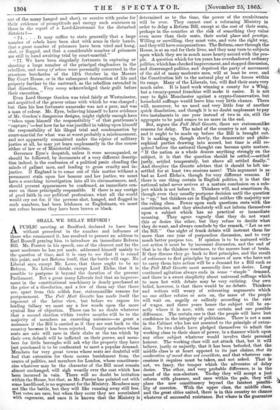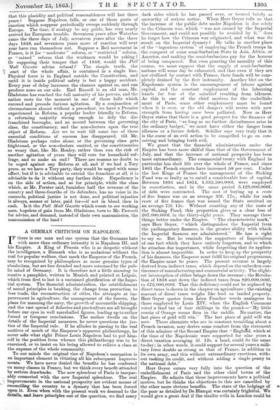SA AT.T, WE DELAY REFORM ?
APUBLIC meeting at Bradford, declared to have been without precedent in the number and influence of those who summoned it, has resolved to present an address to Earl Russell praying him to introduce an immediate Reform Bill. Mr. Forster in his speech, one of the clearest and far the most moderate he has yet made, addressed himself mainly to the question of time, and it is easy to see that it is round this point, and not Reform itself, that the battle will rage. No Liberal says, except Mr. Lowe, that there ought to be no Reform. No Liberal thinks, except Lord Elcho, that it is possible to postpone it beyond the duration of the present Parliament. But a great many Liberals feel that an improve- ment in the constitutional machinery is dearly purchased at the price of a dissolution, and a few of them say that there are, apart from this selfish fear, statesmanlike reasons for postponement. The Pall Mall Gazette has made itself the exponent of the latter view, but before we expose its leading fallacy we must say a few words upon the more cynical line of objection. There can be no doubt whatever that a second election within twelve months will be to the majority of members an exceeding nuisance—as great a nuisance if the Bill is carried as if they are sent back to the country because it has been rejected. County members whose seats are safe will rave in their clubs at the tax which by their own default will be inflicted on their purses, and mem- bers for little boroughs will ask why the property they have just purchased is to be confiscated to meet a popular demand. Members for very great towns whose seats are doubtful will feel that extension for them means banishment from the centre of politics, and members for London, whose constituen- cies whatever may be the character of the Bill must remain almost unchanged, will sigh wearily over the cost which has been incurred in vain. There will no doubt be irritation within the House, but that, as Mr. Forster has pointed out with some hardihood, is no argument for the Ministry. Members may not like the battle, but they will like running away still less. Test votes are rare, but when they occur they are scrutinized with eagerness, and once it is known that the Ministry is determined as to the time, the power of the recalcitrants will be over. They cannot oust a reforming Ministry in order to delay a Reform Bill, except at the cost of their seats, perhaps in the counties at the risk of something they value even more than their seats, their social place and prestige. Willing or unwilling, they must vote, and vote the right way, and they will have compensations. The Reform, once through the- House, is at an end for their lives, and they may turn to subjects. upon which they are in much more hearty accord with the peo- ple. A question which for ten years has overshadowed ordinary politics, whichhas checked improvement, and stopped discussion, and disarranged politics, and deprived the party of movement of the aid of many moderate men, will at least be over, and the Constitution left to the natural play of the forces within its range. Many of the Liberals, too, will find their seats very much safer. It is hard work winning a county for a Whig, but a twenty-pound franchise will make it easier. It is not easy to fight Manchester against a crypto-Conservative, but household suffrage would leave him very little chance. There will, moreover, be no need and very little fear of another quick dissolution, and though it is no doubt unpleasant to pay two instalments in one year instead of two in six, still the. aggregate to be paid comes to no more in the end.
But, argues the Pall Mall Gazette, there are statesmanlike- reasons for delay. The mind of the country is not made up, and it ought to be made up before the Bill is brought out. It is making up, though slowly, the democratic and philo- sophical parties drawing into accord, but time is still re-- quired before the national thought can become quite mature.- " If the nation as a whole desires anything strongly on the- subject, it is that the question should be settled,—settled justly, settled temperately, but above all settled finally." And therefore the Gazette advises that it should be left un- settled for at least two sessions more! This argument is as bad as Lord Echo's, though for very different reasons. If there is one thing certain in English politics, it is that the- national mind never arrives at a mature conclusion on a sub- ject which is not before it. Thinkers will, and sometimes do, though even they usually postpone decision until the question is " up," but thinkers are in England neither the majority nor the ruling class. Power upon such questions rests with the constituencies, and they absolutely will not inform themselves. upon a subject which has no practical or immediate meaning. They agree vaguely that they do not want this or desire the other, but they refuse to decide what they do want, and always conclude by the remark, " Let us see the Bill." One night of frank debate will instruct them far more than one year of purposeless discussion, and to very much better purpose too. If opinion is to be matured with- out action it must be by incessant discussion, and the end of- that is to the thinkers weariness, to the masses heat of brain. If they discuss they go back to first principles, and the result of reference to first principles by masses of men who have not to carry them into action will be a demand for a Bill such as- the Pall Mall Gazette most assuredly does not desire. Long- continued agitation always ends in some " simple " demand, and there is a sweet simplicity about universal suffrage which to men hot with debate may be very enticing. Our own belief, however, is that there would be no debate. Thinkers' and writers will weary of reiterating arguments which no one either refutes or acts on, the mass of the people will wait on, angrily or sullenly according to the rate- of wages, and three years hence the subject will be en-- actly where it is now, with one certain and one possible- difference. The certain one is that the people will have lost confidence in the integrity of politicians. There is not a man in the Cabinet who has not assented to the principje of exten- sion. Its two chiefs have pledged themselves to admit the working class to their share of power, in a faanner which upon any other subject whatever would involve their personal honour. The working class will not attack that, but it will believe, justly or unjustly, that it has been befooled, that the- middle class is at heart opposed to its just claims, that its- moderation of mood does not conciliate, and that whatever con- cessions it requires must be taken, and not asked. That is not, we fancy, the temper which the advocates of delay desire. The other, and very probable difference, is in the- mood of the non-electors. To-day they will accept a just reform with pleasure, and once within the pale, they will place the new constituency beyond the faintest possibia lity of coercion. With the upper class, the middle class,. and the great cities united, there is in this country no chance whatever of successful resistance. But where is the guarantee
that this placidity and political reasonableness will last three years ? Suppose Napoleon falls, or one of those gusts of emotion which reappear periodically sweeps suddenly through Europe. The time, if analogy be any guide, has very nearly arrived for European trouble. Seventeen years after Waterloo came the three days of July, seventeen years after the three days 1848, and seventeen years more of reaction will next year have run themselves out. Suppose a Red movement in France, is it for "moderate " reform, or "restricted " reform, or "mixed " reform that the workmen would be asking ? Or supposing their temper that of 1848, would the Pall Wall Gazette advise refusal $' The simple truth, the 'wart of the whole affair, is contained in a single line. Physical force is in England outside the Constitution, and until it is inside political safety is but a happy accident. Every year of delay increases the chances against us, and can produce none on our side. Earl Russell is an old man, Mr. Gladstone has reached the full maturity of his powers, and the nation rests for the moment in one of ' those lulls which succeed and precede furious agitation. By a conjunction of circumstances almost without a precedent, we have a Premier experienced in Reform, a popular leader friendly to Reform, a reforming majority strong enough to defy the dis- franchised boroughs, and an accord between the governing class, the constituency, and the non-electors upon the true object of Reform. Are we to wait till some one of those essential conditions of success has disappeared, till Mr. Gladstone perhaps rules alone, or the governing class gets frightened, or the non-electors excited, or the constituencies so weary that, like Mr. Henley, rather than run the risk of another agitation of years they will vote for household suf- frage, and so make an end ? There are reasons no doubt to be urged against any Reform at all, and if we had a Tory press, as we have a Tory party, they would be urged with some effect, but if it is advisable to extend the franchise at all, it is advisable to do it without any further delay. Expediency is on the side of action, and as for principle, while the class which, as Mx. Forster said, furnishes half the revenue of the country and three-fourths of its defenders, has no voice in its counsels, political justice is not done, and political injustice is always, sooner or later, paid for—if not in blood, then in .cash. Is it the Pall Mall Gazette which wants to see working men, hopeless of gain from Mr. Gladstone, turn to Mr. Fawcett for advice, and demand, instead of their own manumission, the manumission of the land ?































 Previous page
Previous page